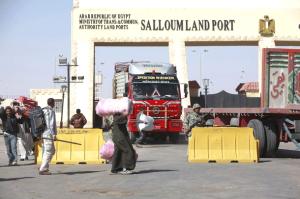The International Monetary Fund (IMF) confirmed its determination to help Egypt during the latest round of discussions on Monday leaving it up to the government to implement the required reforms.
During his recent visit to Cairo, the director of the Middle East and Central Asia Department of the International Monetary Fund (IMF), Masood Ahmed, held meetings with President Mohamed Morsy, Prime Minister Hesham Qandil, Central Bank of Egypt Governor Farouk El Okdah, Finance Minister Al-Morsy Al-Sayed Hegazy, Minister of Planning and International Cooperation Ashraf Al-Araby, and other officials to discuss the $4.8 loan desperately sought by Egypt.
At the conclusion of his visit, Ahmed stated that the Egyptian officials “expressed their firm commitment to articulate and implement a home-grown macroeconomic programme that enjoys broad support and addresses these challenges. The authorities also reiterated their request for financial support from the IMF for such a programme.”
Ahmed confirmed that IMF remains committed to supporting Egypt in addressing its increasing economic challenges and moving to a more inclusive model of economic growth through a socially-balanced home-grown programme. He added that an IMF technical team would visit Cairo in the coming weeks to resume discussions on possible IMF financial support.
The IMF delegation had reached a preliminary agreement with the Egyptian government after negotiations held in November that was supposed to get approval from the IMF executive board late December.
“When the IMF delegation was here in November they reached a preliminary agreement on the programme, the government was supposed to execute it,” said Samir Radwan a former finance minister. “Then they suspended the execution of the programme because of the referendum on the new constitution before it gets approved by the IMF executive board.
“Under pressure from the American government, the IMF delegation came back to show their commitment to Egypt” Radwan continued. “It’s clear that there are new facts, but the question remains whether the government will be able to put forward this programme, publish it and get public support before the upcoming parliamentary elections.
“The IMF wants to know if they are going to execute the programme, or whether there is a new one. The plan was not published on the cabinet’s websites, the only thing published was the tax increase on 25 items which was suspended few hours later, yet no precise info or dates were made public.”
The former minister of finance said as long as the government is focused on parliamentary elections and voter popularity it won’t be able to execute economic reforms.
Alia Moubayed, senior economist for the Middle East and North Africa at Barclays Bank, told the Financial Times on Monday: “Given how precarious Egypt’s macroeconomic situation is, a deal is needed as soon as possible – yesterday rather than today.
“The ball now is in the court of the Egyptian authorities [but] we have yet to hear from them about their plans to start implementing the agreed upon reforms. Further delays imply further deterioration in Egypt’s macro outlook and a need for a bigger fiscal and external adjustment than originally envisaged,” continued Moubayed.



